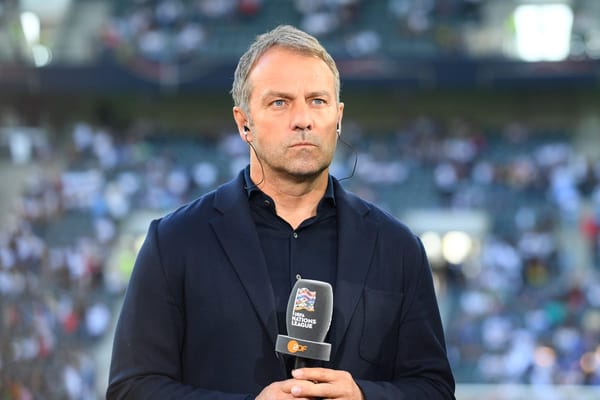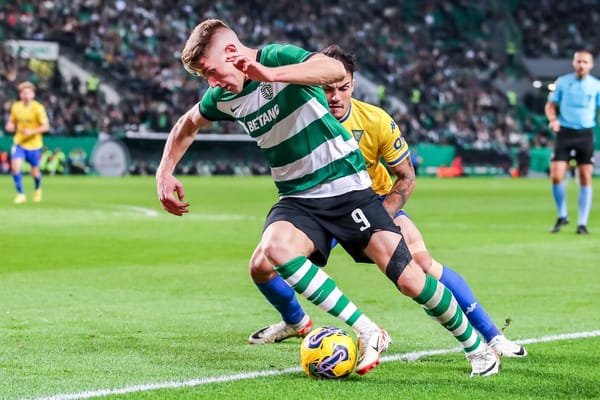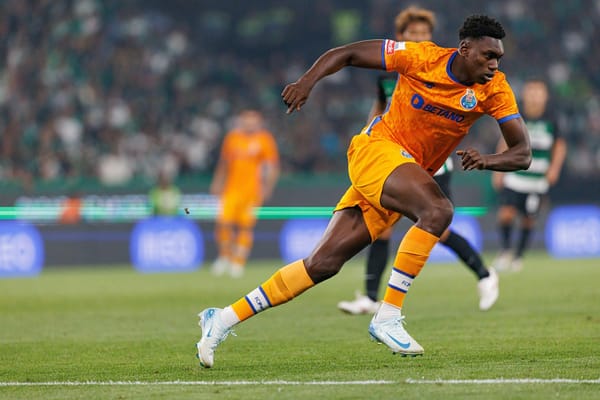9 years of Barca's "Rebuild" and "Revolution"
Barcelona's transfer strategy over the past nine years can be summed up in one word: shambolic. Despite acquiring 57 professionals and promoting 31 youth players, the squad remains unbalanced and incomplete
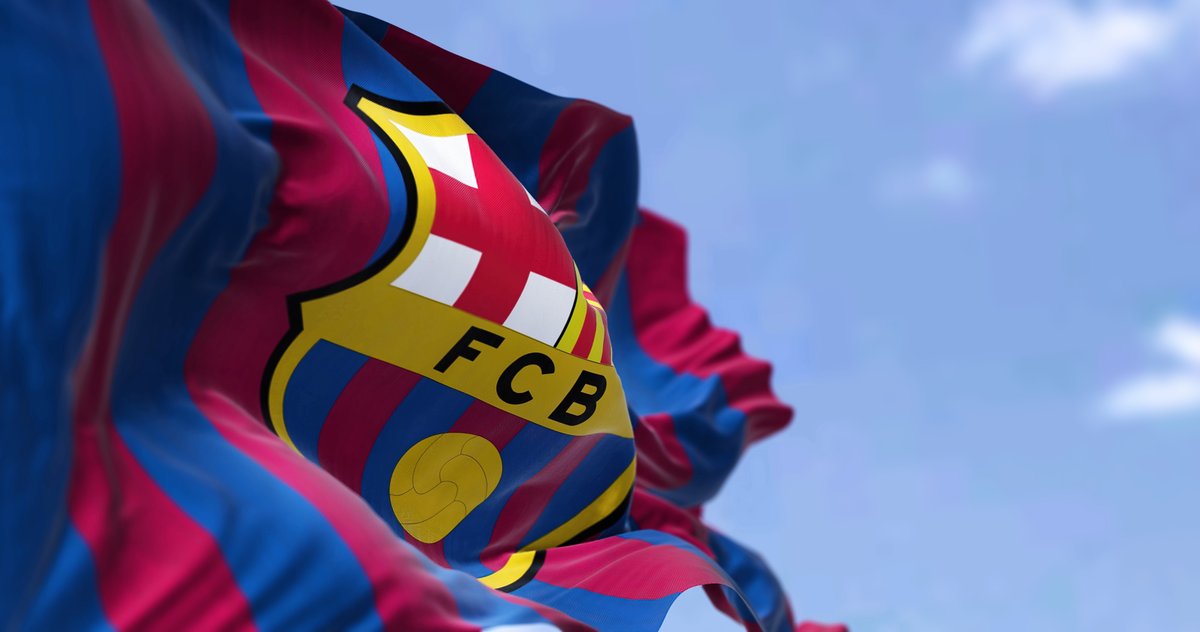
Barcelona's 2014/15 Champions League triumph, led by the formidable MSN trio (Messi, Suárez, Neymar), marked the end of an era. Luis Enrique and Josep Maria Bartomeu extended their tenures following this treble success, but beneath the surface, change was brewing. The golden generation was fading, and discussions about squad rejuvenation had begun. Zubizarreta's signings of Rakitic and Suárez, pivotal to the treble, signalled the start of this transition.
The following nine seasons saw Barcelona's European and domestic dominance wane. Financial troubles nearly bankrupted the club, a situation exacerbated by the COVID-19 pandemic. Iconic figures like Messi, Suárez, Xavi, Iniesta, Alba, Busquets, and Pique all departed in what can only be defined as an exodus.
In 2021, Bartomeu's presidency ended, with Laporta returning to "save the club." This period saw six coaches and six sporting directors attempt to revolutionise the squad. Revolution did not happen. Barcelona's play declined, and their status as a top club diminished.
Now, Hansi Flick takes the helm, inheriting a club in flux. This nine-year period however raises questions about Barcelona's squad planning, investment, recruitment, player turnover, youth integration, and transfer strategies. Analyzing these factors is crucial to understanding Barcelona's current situation and future prospects.
Our examination begins with the 2015/16 season, immediately following Barcelona's treble win, tracing the club's evolution through a tumultuous decade
Season 2015/16

The 2015/16 season dawned in the afterglow of Barcelona's treble triumph, a time when optimism ran high among the Cules. The fanbase's excitement centered on the arrival of Arda Turan, the fiery midfielder who had captured their imagination with his passionate (if controversial) antics, most notably throwing his shoe at a referee during a heated match. Simultaneously, La Masia, Barcelona's famed youth academy, seemed poised to deliver its next crop of superstars. Twitter experts buzzed with anticipation about Sandro Ramirez, Munir El Haddadi, and Alen Halilovic.
Suffice to say it didn't turn out that way.
Turan's arrival brought excitement and concern, but the season also marked two significant departures. The club bid farewell to Xavi Hernandez and Pedro Rodriguez. Xavi, widely regarded as one of the greatest midfielders in the club's storied history, left an immense void in the team's core. His vision, passing accuracy, and ability to control the tempo of the game were never really backfilled.
Pedro, though less heralded, was no less crucial to Barcelona's success. A product of La Masia himself, he had been an integral part of Pep Guardiola's revolutionary team. His work rate, versatility, and knack for scoring in big moments made him a fan favourite and a coach's dream. The transfers raised questions about the club's ambition and ability to reinforce the squad effectively and replace departing legends adequately.
Transfer spend profit: + €13.00 M
Season 2016/17
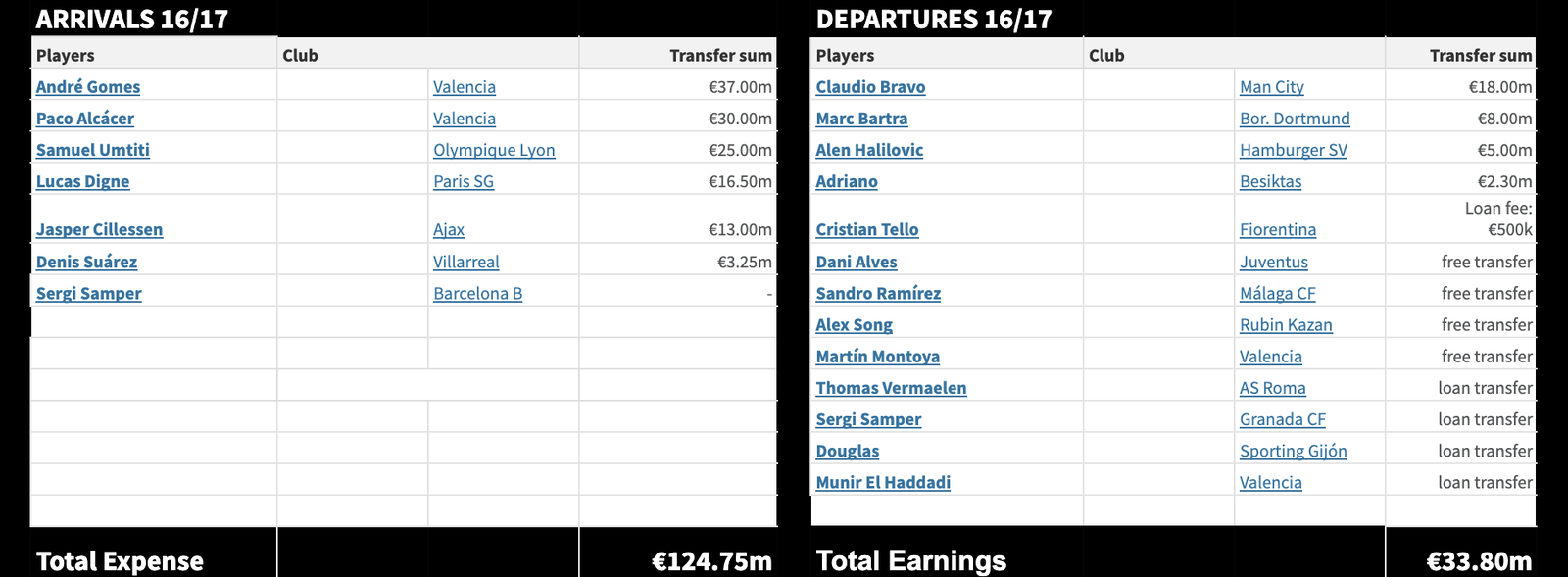
The 2016/17 season marked Luis Enrique's ambitious attempt at rebuilding the squad. It was a significant failure.
Arrivals included Andre Gomes, Samuel Umtiti, Paco Alcacer, Jasper Cillessen, and Lucas Digne. Gomes, touted as a midfield dynamo, crumbled under the intense pressure of the Camp Nou. Samuel Umtiti initially showed promise, becoming a solid defensive presence, but unfortunate injuries would later derail his career at the club. Lucas Digne, while competent, never truly excelled to the level required at Barcelona. Cillessen, primarily a cup goalkeeper, delivered some spectacular performances in the Copa del Rey. However, frustrated by limited playing time, he eventually departed in search of a starting role elsewhere. Paco Alcacer, brought in as a super-sub striker, found himself overshadowed by the formidable MSN trio of Messi, Suarez, and Neymar.
The true failure of this transfer window lay in its inability to address the squad's actual needs. Most of these signings added little to no value to the team's overall quality or depth. The club's decision-makers seemed to prioritise quantity over quality, neglecting to consider how these new additions would fit into the team's playing style or long-term plans.
Transfer spend deficit : - € 90.95 M
Season 2017/18
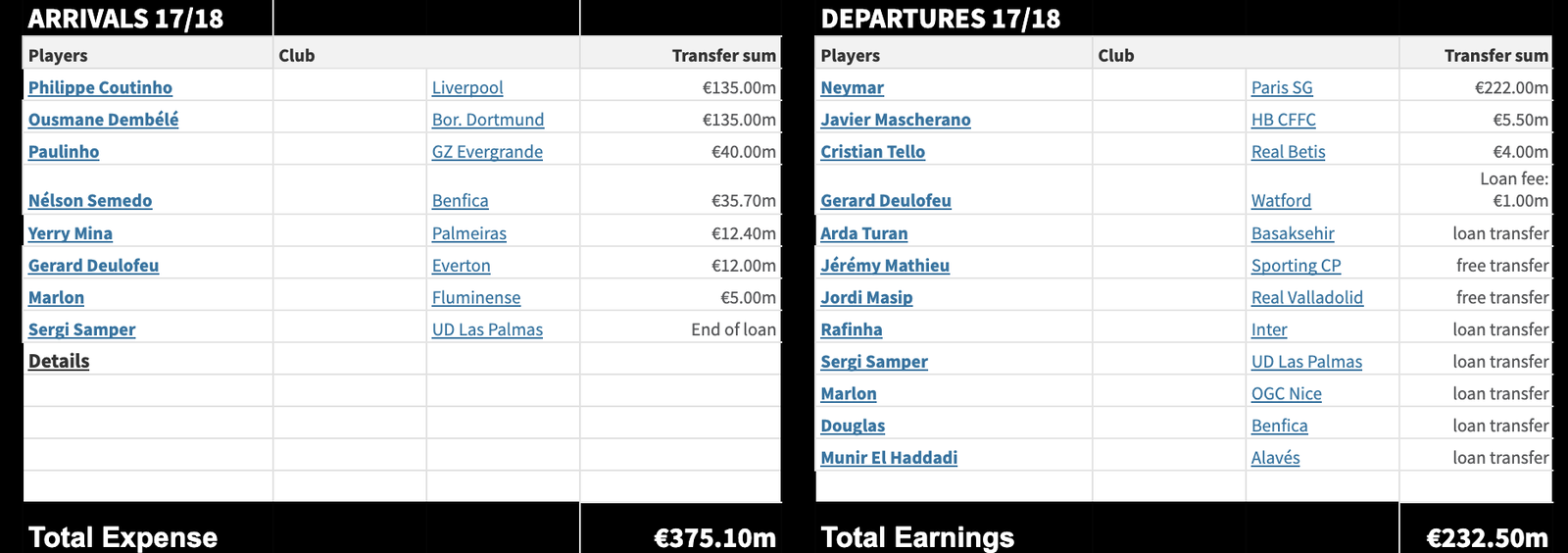
The 2017/18 season unfolded in the wake of Barcelona's legendary "remontada" against PSG, a victory that paradoxically marked the beginning of the end. The euphoria of that historic comeback was short-lived, as Neymar departed for PSG to escape "Messi's shadow". Shadows stayed as is, the world just lost one of the greatest talents in football forever.
The club's reaction to Neymar's departure was panic-driven and destructive with the arrivals of Dembele, Paulinho and Coutinho.Paulinho, the less heralded, surprised many with his effectiveness. He adapted quickly to Barcelona's style, contributed crucial goals, and played a key role in several victories. Yet, as swiftly as he had arrived and made his mark, he departed, leaving fans wondering the financial dealings around his entire transfer,
Coutinho, and Dembele on the other hand, arrived with great fanfare and with even fancier price tags. Touted as Neymar's replacement and Iniesta's heir, they were supposed to be Barca's future. Both failed spectacularly leaving the fanbase irate and the club crippled from a financial point of view. Theirs became a cautionary tale of mismanaged expectations and poor fit, culminating in two surreal moments. Coutinho scored two goals against Barca while on loan with Bayern Munich and Dembele left Barca to join PSG (years later) and scored two goals to dump Barca out of the Champions League.
Nasser El Khelafi could not have written a better revenge script.
The summer also saw the arrival of Nelson Semedo, a right-back whose impressive YouTube highlights had Barça fans dreaming of the second coming of Dani Alves. Reality, however, would prove to be far less spectacular.
This was the transfer window where the wheels came off. Reactionary spending, poor player profiling, and a disconnect between recruitment and tactical needs. The club's financial health and sporting project both took significant hits, setting the stage for a decade of mediocrity.
Transfer spend deficit: - € 142.6 M
Season 2018/19
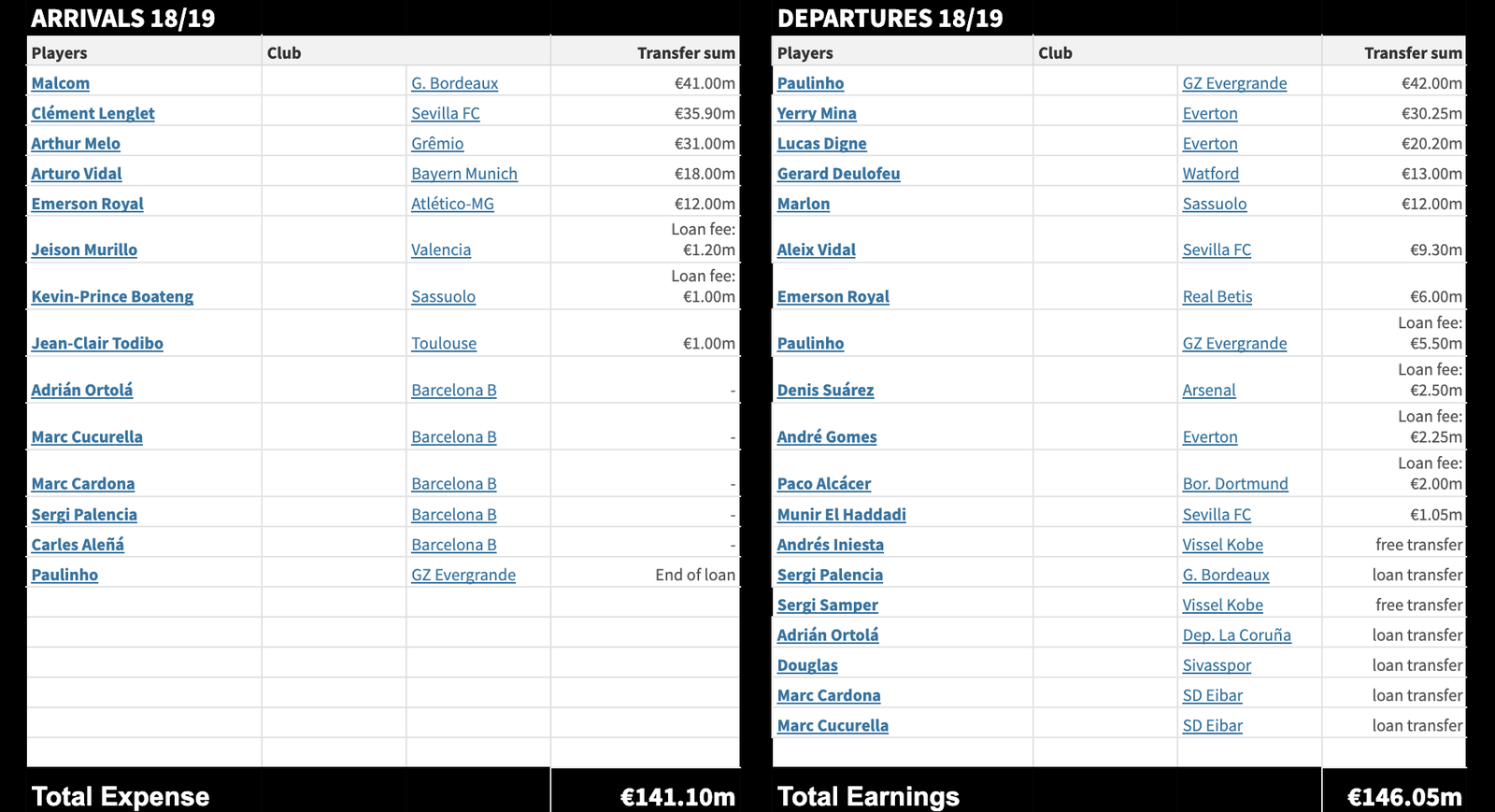
The 2018/19 season was again marked by a series of bizarre and ultimately disappointing transfers, each with its own unique flavour of drama and misplaced hype.
The saga of Malcom's signing became an instant legend in transfer market lore. Barcelona hijacked Roma's deal for the Brazilian winger in a last-minute swoop, leading to the surreal spectacle of fans tracking his flight on FlightRadar. No one knows why there was so much excitement about him. If that wasn't bizarre, in a move that left everyone scratching their heads, Barca then brought in Kevin Prince Boateng, a journeyman midfielder-turned-forward, ostensibly to fill the void left by Neymar's departure a year earlier.
To bolster the midfield, Barca then went all the way to Gremio Brazil, to persuade YouTube compilation confirmed Xavi regen, Arthur Melo. Arthur wasn't Xavi and disappeared as fast as he had come.Then there was that great transfer mystery - Emerson Royal a transfer so convoluted it left even the most ardent football finance experts bewildered. Purchased in a joint financial operation with Real Betis, Emerson's Barcelona career was over almost before it began, leaving fans to ponder the point of such complex machinations.
And finally to crown it off, Barca added "physicality" to their ranks with the Chilean warrior Arturo Vidal. Vidal's passion was never in question but seemed at odds with the club's traditional emphasis on technical prowess and positional play.
These transfers collectively painted a picture of a club without any coherent long-term plan. There simply was no focus on building a cohesive squad aligned with Barcelona's playing philosophy.
Transfer spend profit: + € 4.95 M
Season 2019/20
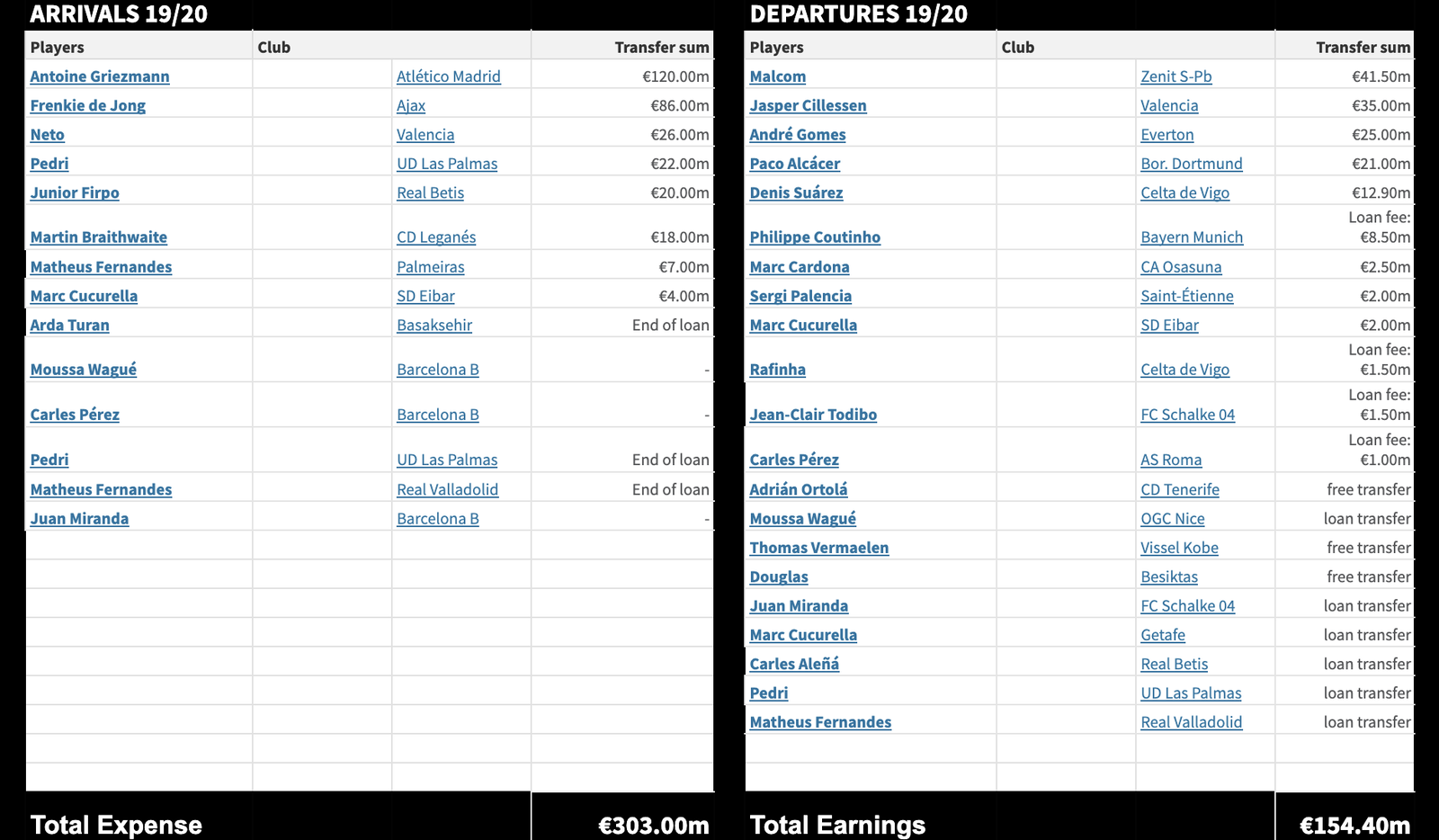
The 2019/20 season unfolded in blissful ignorance of the global pandemic that would soon reshape the world. Barcelona, oblivious to the impending crisis, continued their high-stakes gambles in the transfer market. In a move that raised eyebrows across the football world, Barcelona signed Antoine Griezmann for over €100 million. The logic behind spending such an enormous sum on a player whose optimal position and role directly conflicted with Lionel Messi's was questionable at best.
It didn't end there.
Inspired by Ajax's fairy-tale run in the Champions League, Barcelona also secured the services of Frenkie de Jong. The Dutch midfielder arrived with lofty expectations. While his talent was undeniable, the coming years would reveal the challenges of living up to such enormous hype in a team struggling to define its identity.
In a rare moment of foresight, Barca then acquired a relatively unknown, slight midfielder from Las Palmas named Pedri. This unheralded signing would prove to be one of their better moves in years, though its true value wasn't immediately apparent.
As many had predicted, Griezmann struggled to find his place in the team. The Frenchman's need for central positioning and creative freedom clashed directly with Messi's role, leaving him often stranded in unfamiliar and ineffective positions. This resulted in an unhappy player and frustrated fans, who saw little return on the club's massive investment. Barca were now consistently spending beyond their means. The wage bill had ballooned to unsustainable levels, with new signings commanding enormous salaries that the club's revenue couldn't justify.
This season marked a terminal point in Barcelona's decline. The cracks in their recruitment strategy had become chasms, and the financial recklessness had put them on the brink.
Then the pandemic hit.
Transfer spend deficit: - € 142.6 M
Season 2020/21
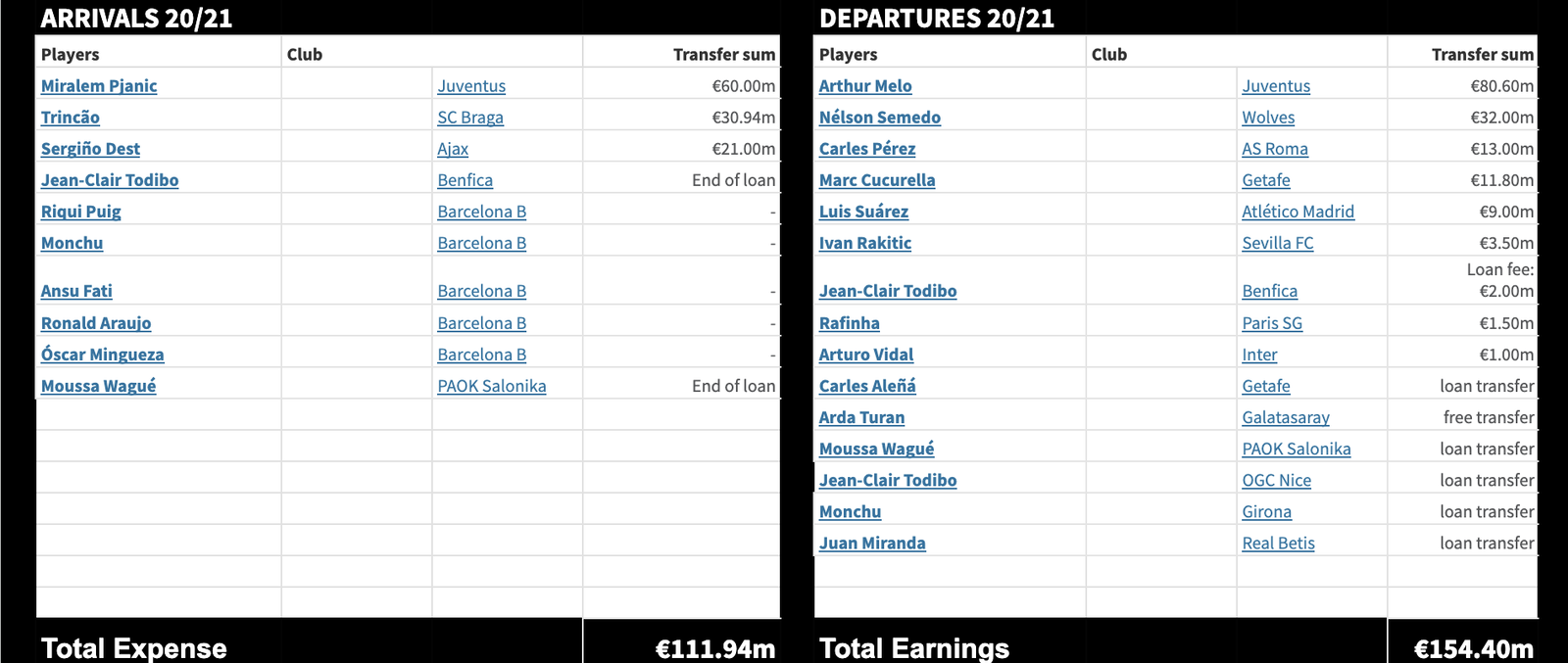
The 2020/21 season began with turmoil. Ernesto Valverde had been dismissed mid-season in 2019, replaced by Quique Setien. Setien's tenure culminated in Barcelona's most humiliating Champions League defeat - an 8-2 demolition by Bayern Munich that laid bare the extent of the club's decline. This disastrous result led to both coaches' departures, with club legend Ronald Koeman stepping in to steady the ship.
On-field problems however paled in comparison to the drama unfolding behind the scenes. Messi's burofax exploded with his request to leave Barca. Television interviews, salary details on newspapers, ugly doesn't start to describe what happened in it's aftermath.
In hindsight, allowing Messi to leave at this juncture might have been the best decision for all parties. Barcelona could have secured a substantial transfer fee, alleviating some of their mounting financial pressures. Messi's departure could have paved the way for Antoine Griezmann to become the focal point of the attack, potentially justifying his hefty price tag. The funds from Messi's transfer could have been reinvested to strengthen the midfield and attack. Messi stayed, only to leave for free a year later for free, with the club in an even more precarious financial position.
There were more questionable decisions, like the Arthur-Pjanic swap deal, which seemed more about balancing books than improving the team. Investments in young talents like Trincao and Dest failed to yield any returns. The club's treatment of legends was particularly harsh. Luis Suarez was dismissed via a brief phone call, only to excel at Atletico Madrid and help them win the league. Ivan Rakitic was also let go unceremoniously
The only bright sports in this horrifying transfer window, were Barca youth team products Ansu Fati and Ronald Araujo, alongside the promising Pedri.
Transfer spend profit : + € 42.46 M
Season 21/22
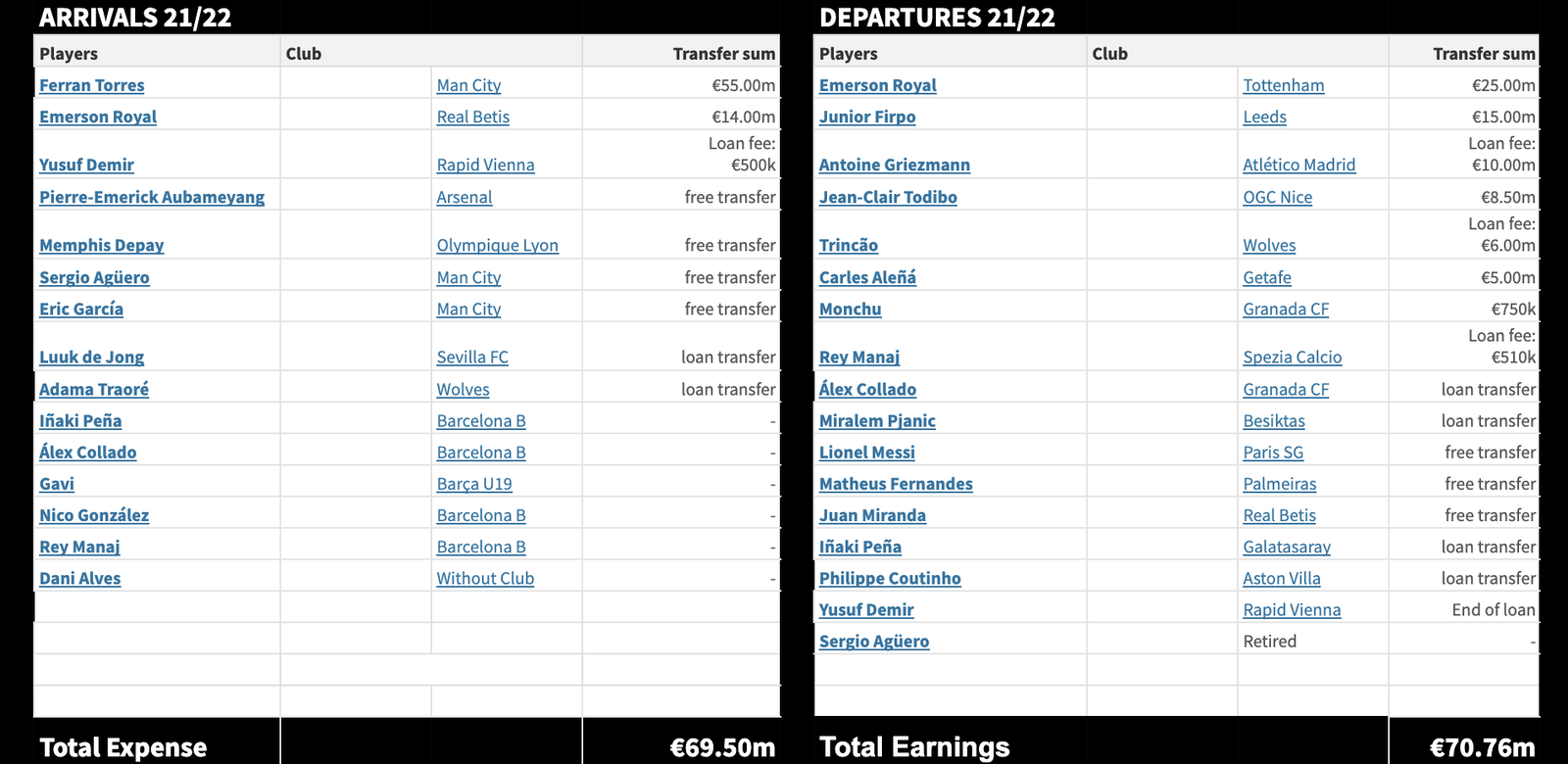
The post-COVID era hit Barcelona with brutal force. Joan Laporta returned as president after a decade and despite expectations of Messi's contract renewal, Laporta's first major decision was to release the club's greatest player, citing unaffordable wages. 16 more players left. This move sent shockwaves through the fanbase, leaving a wound that remains raw to this day.
However, this painful departure marked the beginning of a genuine fiscal surgery, under severe financial constraints. The subsequent transfer windows was nothing short of dramatic, particularly during the winter break. Barcelona opened its doors to a variety of players who were out of contract: Arsenal's outcast Pierre-Emerick Aubameyang, Manchester City legend Sergio Aguero, Memphis Depay, and Ferran Torres. In a nostalgic twist, Dani Alves made a surprise return as well. Midseason, the club made another significant change, replacing Ronald Koeman with club legend Xavi Hernandez as manager.
Amidst these numerous changes, two unexpected narratives emerged:
- Aubameyang's immediate impact, achieving more for Barcelona in six months than many recent signings had in years.
- The surprising heroics of Luuk De Jong, whose crucial goals in just seven games helped Barcelona climb from 9th to 2nd in the league, earning him the title of Barcelona's last clutch player.
While not successful in terms of trophies, this season rekindled a sense of fun and hope among Barca fans. Despite the ongoing challenges, there was a palpable sense of optimism about the club's future direction under Xavi's leadership
Transfer spend profit : + € 1.26 M
Season 2022/23
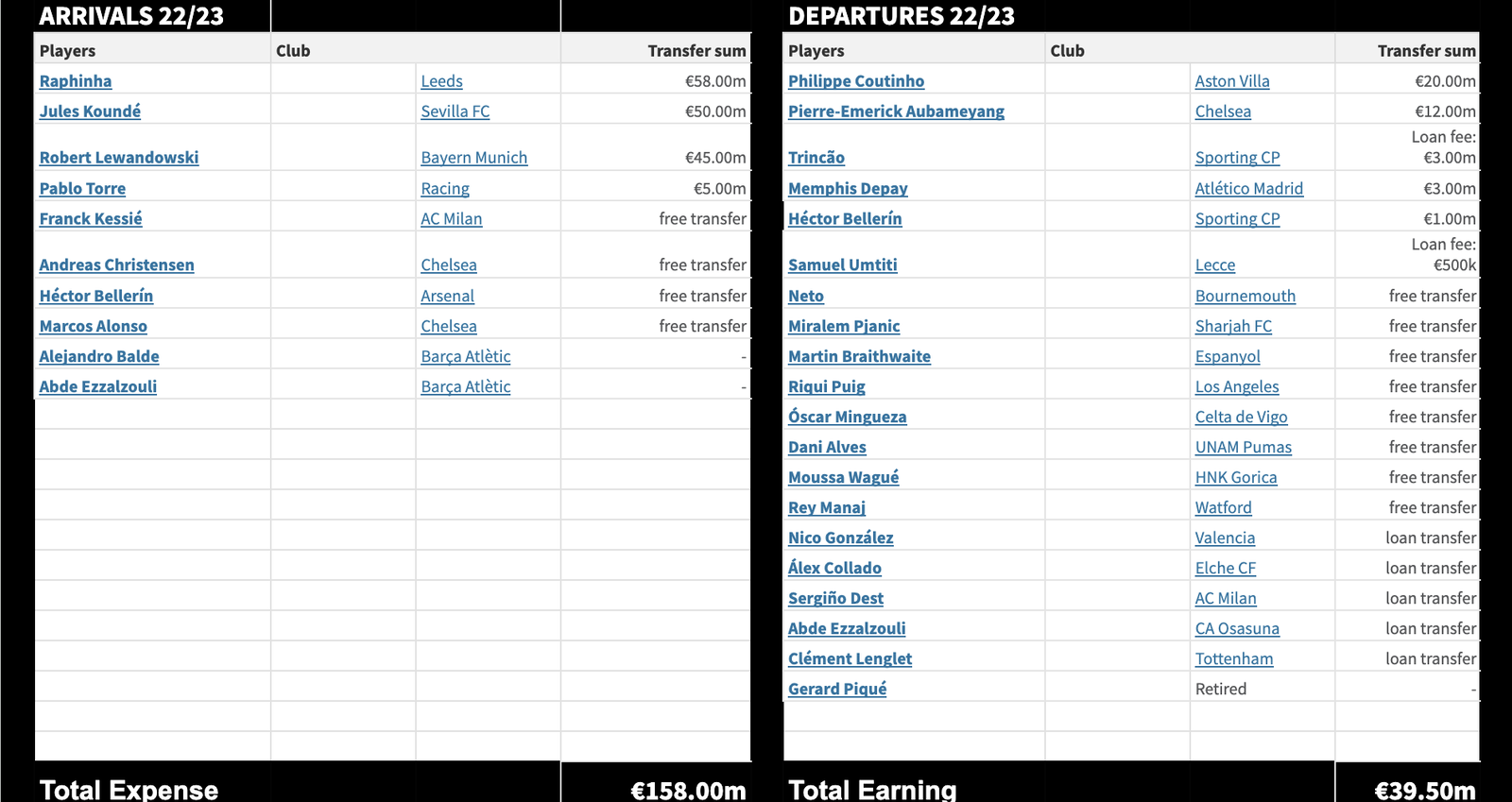
Xavi's first full season as head coach marked a turning point for Barcelona. Faced with an aging squad and financial turmoil, the club embarked on a controversial strategy that would become known as the "Palancas". To address their crippling debt of over €2 billion, Barcelona took the unprecedented step of selling off future revenue streams. They raised nearly €800 million by leveraging their audiovisual rights, a move that drew both criticism and curiosity from the footballing world.
With newfound flexibility, Barcq went shopping. The transfer window became a whirlwind of activity, perfectly captured by journalist Gerard Romero's catchphrase "están pasando cosas" (things are happening). The club secured a string of high-profile signings: Robert Lewandowski, Jules Kounde, Raphinha, Andreas Christensen, Marcos Alonso, Franck Kessie, and Hector Bellerin. This influx of talent, coupled with the bittersweet retirement of club legend Gerard Pique, reshaped the squad dramatically.
The rationale behind this aggressive investment was to reignite what Barcelona termed the "virtuous cycle": success on the pitch would lead to increased revenue, which could then be used to improve the club's financial health. While the long-term wisdom of this approach remains debatable, it did yield immediate results. Barcelona ended their four-year league title drought, providing a tangible return on their risky financial manoeuvres.
Transfer spend deficit: - € 118.50 M
Season 23/24
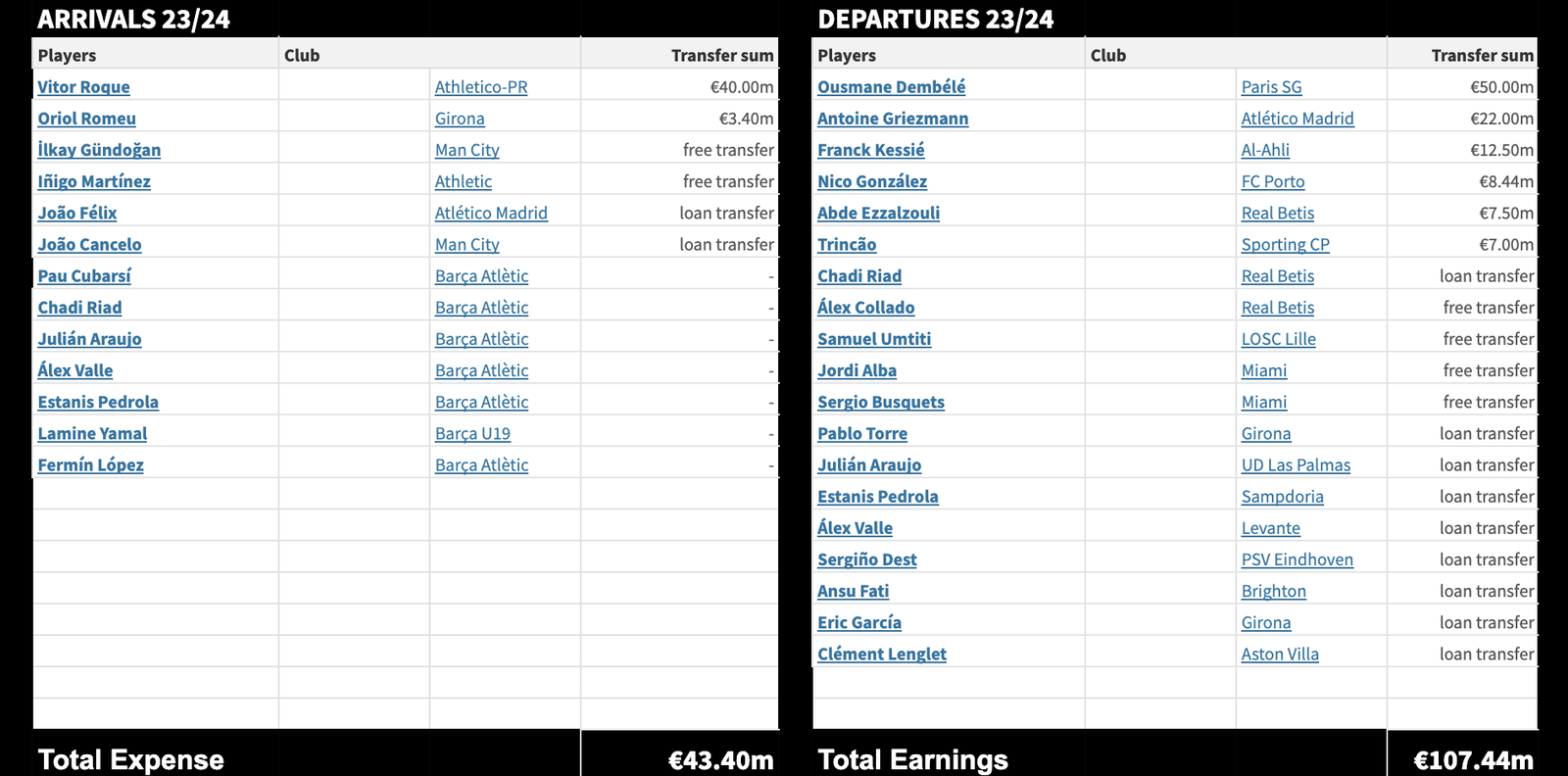
This was the summer of financial austerity. Of coming to terms with the palancas hangover. The summer transfer window saw Barcelona spend a mere €3.5 million, followed by a surprising €40 million outlay in the winter for Brazilian prospect Vitor Roque. The latter acquisition raised eyebrows, more so given Roque spent his first six months primarily on the bench. For a financially bankrupt club the logic of this deal was baffling.
The transfer window's most significant storyline however, revolved around Ousmane Dembele. After a mini soap opera around contract renewals the previous season, Monsieur Dembele decided to up his sticks and bid adieu to the Camp Nou by activating a release clause in his contract.
The Dembele saga was a litany of ironies. Despite Xavi's repeated public support, Dembele orchestrated his exit, leaving the coach without a key player for his tactical vision. This departure, facilitated by Barcelona legend Luis Enrique (who became PSG coach), saw Dembele follow the path of Neymar and Messi from Camp Nou to the Parc des Princes. Remarkably, after spending most of his seven-year Barcelona tenure plagued by injuries, Dembele enjoyed an injury-free season at PSG, raising questions about Barcelona's fitness regime. The final twist came when Dembele scored twice to eliminate Barcelona from the Champions League quarter-finals, only to underperform in subsequent matches. The whole sequence of events not only highlighted Barclelona's complete capitulation and lack of any sense of professionalism, pride or identity, it also put forward the ugly capitalist reality of club football.
So what are the key takeaways from these 9 years of transfers and rebuilds?
- Financial Summary:
- Direct purchases: 40 players
- Loan/free transfers: 17 players
- Outgoing loans/free transfers: 95 players (includes multiple loans and B team players)
- Direct sales: 48 players
- Youth team promotions: 31 players
- Current first-team players from youth set up: 7
- Total spend: €1.37 billion
- Total earnings: €977.5 million
- Transfer deficit: €400 million
Barcelona's transfer strategy over the past nine years can be summed up in one word: shambolic. Despite acquiring 57 professionals and promoting 31 youth players, the squad remains unbalanced and incomplete. The turnover has been astronomical, with over 120 departures and about 90 arrivals. Yet, critical depth is still lacking in crucial areas, revealing severe deficiencies in scouting, player profiling, and team planning. 70% of recent transfers have failed to stabilise the team's core. Most high-priced signings have been sold at a loss or loaned out to reduce wage bills.
While factors like COVID-19 and operational mismanagement contributed to the financial crisis, these transfer statistics expose a fundamental flaw in the club's strategy, regardless of leadership. These issues persists even today, underscoring the long-term impact of poor transfer decisions. The mismanagement has significantly contributed to Barcelona's current financial and competitive struggles, with recovery likely to take several seasons
So what should we expect going forward
The transition from Xavi to Hansi Flick marks another new chapter for Barcelona. Despite media speculation, the club's financial reality precludes lavish signings. Barcelona faces multiple financial pressures: high salaries for aging players, loan repayments, and the stadium renovation project. Given these circumstances, fiscal responsibility should be the priority for the next few years. Barcelona's constraints necessitate a strategic pivot towards La Masia and the B team, with only occasional targeted signings. This forced shift could be a blessing in disguise, for the cub to balance its finances. The club should use this period to construct a coherent long-term project centered on youth development, enhancing their football structure and refining talent scouting.
Fortunately, Barcelona is well-positioned for this approach. The groundwork laid by Xavi and Koeman has revitalized youth integration, yielding promising talents like Gavi, Pedri, Balde, Araujo, Cubarsi, and Lamine Yamal. Rafa Marquez's excellent work with the B team has produced additional prospects like Sergi Dominguez, Pau Victor, Marc Casado, Marc Bernal, Quim Junyent, Mikha Faye, Toni Fernandez, Hector Fort, and Martin on the verge of first-team consideration.
This abundance of young talent is particularly valuable during financial constraints. Barcelona should capitalise on this opportunity, making strategic long-term decisions that prioritise player development and team cohesion. By focusing on nurturing this talent and adapting to modern football trends, the club can build a sustainable future. German football's reputation for grassroots development and disciplined structures aligns well with Barcelona's current needs. Combining this approach with La Masia's rich tradition could prove potent under Flick's leadership.
Barcelona's current predicament is the result of long-term mismanagement and financial imprudence. While the past three seasons have seen tough but necessary decisions, the path forward remains challenging. For fans accustomed to success, this period is undeniably difficult.
However, as a long-time fan who has seen both triumphs and struggles, I find hope in watching the young kids develop. If Flick succeeds in instilling discipline while developing a core of dependable players, and if Barcelona can evolve without losing their fundamental identity, the future will be better.
The immediate focus should be on building, continuing the work initiated by Koeman and Xavi. Flick's challenge is to elevate the sporting aspect, while Laporta's team must prioritise debt management.
Our collective memory tends to be short-lived, with success often overshadowing past struggles. Barca currently stand at a critical juncture. Their potential for future success is real. The key lies in creating the right sporting environment which can transform this promise into concrete achievements.
The next ten years transfer deficit can look very very different.
If you enjoyed this, consider buying us a coffee:) we would be grateful.

